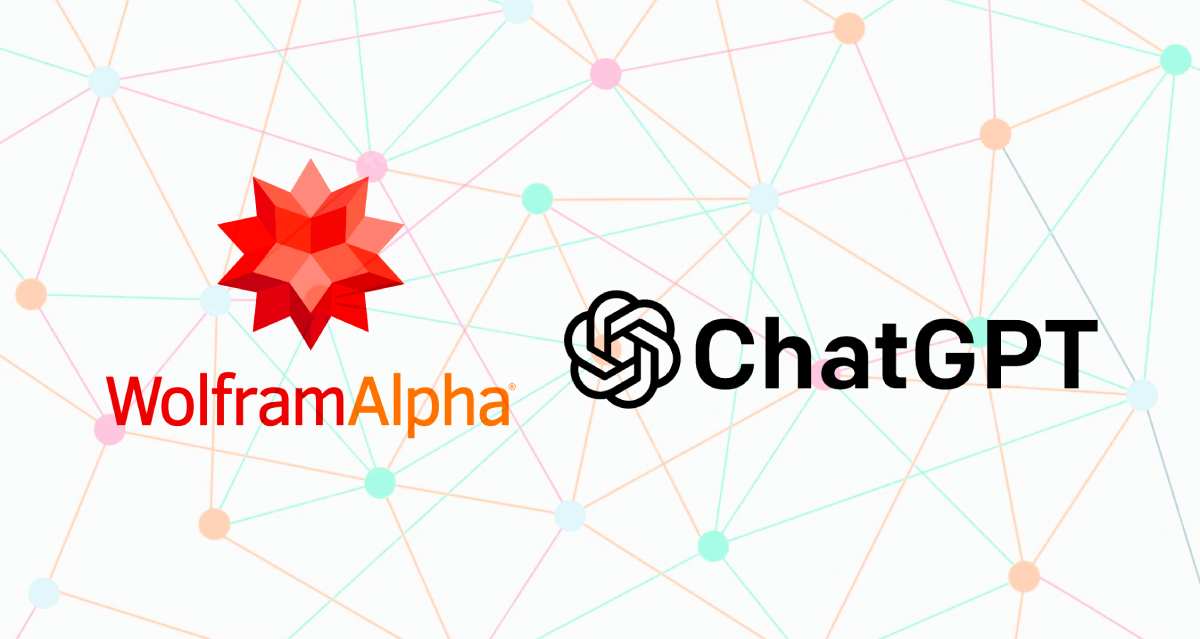In Data Science
Two AI-powered tools that have gained immense popularity are ChatGPT and Wolfram Alpha

Management

Artificial intelligence has revolutionized the way we live, work and interact with technology. From chatbots to voice assistants, AI-powered tools are now an integral part of our daily lives. Two such AI-powered tools that have gained immense popularity are ChatGPT and Wolfram Alpha. While ChatGPT is a language model that can engage in human-like conversations, Wolfram Alpha is a computational knowledge engine that provides answers to factual queries. In this article, we'll take a deep dive into both these AI-powered tools, their features, benefits, and limitations.
Wolfram Alpha and ChatGPT together
While Wolfram Alpha and ChatGPT are both powerful tools in their own right, they can also complement each other in many ways. For example, if a user is searching for information on a specific topic, they could use Wolfram Alpha to generate a comprehensive report on that topic, complete with charts, graphs, and other visual aids. They could then use ChatGPT to engage in a more nuanced conversation about that topic, asking follow-up questions or seeking clarification on certain points.
Education
One potential use case for these two tools working together is in the field of education. Students could use Wolfram Alpha to generate reports on various topics, while also engaging in conversations with ChatGPT to deepen their understanding of those topics and ask follow-up questions. This could help students to not only memorize facts and figures but also to develop a deeper understanding of the underlying concepts and principles.
Scientific research
Another potential application for Wolfram Alpha and ChatGPT is in the field of scientific research. Researchers could use Wolfram Alpha to generate reports on specific topics, while also using ChatGPT to engage in conversations with other researchers or to seek out new insights and ideas. This could help to accelerate the pace of scientific discovery and lead to new breakthroughs in a wide variety of fields.
Downsides and risks
Of course, there are also potential downsides to using these tools. One concern is that they may lead to a reduction in critical thinking skills, as users become overly reliant on these tools to generate information and answers. Another concern is that these tools may reinforce existing biases and assumptions, leading to a lack of diversity and creativity in the solutions generated.
To mitigate these risks, it is important to use these tools in a thoughtful and intentional way. Users should be encouraged to engage in critical thinking and to seek out multiple sources of information, rather than relying solely on these tools. It is also important to ensure that these tools are designed in a way that is inclusive and that takes into account the needs and perspectives of all users.
How to add Wolfram Plugin to ChatGPT
To add the Wolfram plugin to ChatGPT, follow these simple steps. However, note that this feature is currently only available to ChatGPT Plus users.

Wolfram Plugin in ChatGPT
First, select and install the plugin from within ChatGPT. Once the Wolfram plugin is installed, it will allow ChatGPT to access information and features from Wolfram, a third-party developer. When a user sends a query to ChatGPT, the plugin will rephrase it and send it over to Wolfram to compute. Wolfram will then respond with the answer, which ChatGPT will process using advanced techniques before relaying it back to the user.
To use the Wolfram plugin, simply say "Use Wolfram" to send the query to the plugin. Alternatively, specify "Use Wolfram" or "Use Wolfram Language" depending on your specific needs. In the case of the Wolfram Language, you can review the actual code that was sent and provide feedback on any functions that don’t exist.
The Wolfram plugin is just one of several ChatGPT plugins launched by OpenAI. These plugins give ChatGPT the ability to access information and features from third-party developers and the internet at large.

Wolfram Alpha vs ChatGPT
Wolfram Alpha and ChatGPT using API
Using Wolfram Alpha within ChatGPT is a simple process that can be done by incorporating Wolfram Alpha's API into ChatGPT's programming. The API allows developers to integrate Wolfram Alpha's computational knowledge engine into their applications, enabling them to make complex queries and receive detailed answers in real-time.
To use Wolfram Alpha within ChatGPT, developers can follow these steps:
-
Obtain an API key from Wolfram Alpha: To use the API, you'll need to register for an API key on the Wolfram Alpha website. Once you've registered, you'll receive a unique API key that you can use to authenticate your requests.
-
Incorporate the API into ChatGPT's programming: Developers can incorporate the Wolfram Alpha API into ChatGPT's programming by adding the necessary code to their existing scripts. This will enable ChatGPT to send queries to Wolfram Alpha and receive detailed answers in response.
-
Create a user interface for queries: Once the API has been incorporated, developers can create a user interface that allows users to input their queries and receive answers from Wolfram Alpha. This can be done using a variety of programming languages and frameworks, such as Python, JavaScript, or HTML/CSS.
-
Test and refine the integration: After the API and user interface have been created, it's important to thoroughly test the integration to ensure that it's working as expected. This may involve debugging code, refining the user interface, and making changes to the integration as needed.
Using Wolfram Alpha within ChatGPT can enhance the chatbot's capabilities and provide users with more detailed and accurate answers to their queries. With the help of the Wolfram Alpha API, developers can easily integrate this powerful computational knowledge engine into their applications and create a more robust and useful tool for users.
More about ChatGPT
ChatGPT is a language model developed by OpenAI, which is one of the leading research organizations in the field of AI. ChatGPT is based on the GPT-3 architecture, which is one of the most advanced language models to date. The model has been trained on a massive amount of data, which includes a diverse range of topics, making it capable of generating human-like responses to any given prompt.

ChatGPT architecture
ChatGPT's conversational abilities have been widely praised for their accuracy and coherence. The tool can engage in conversations on a wide range of topics, from weather updates to philosophy. ChatGPT can also be used for various practical purposes, such as generating summaries, writing emails, and even coding.
Adapt to the user's style
One of the most significant benefits of ChatGPT is its ability to learn and adapt to the user's style and preferences. As the tool interacts with the user, it can pick up on the user's language patterns, tone, and writing style, which enables it to generate more personalized and relevant responses over time.
Automating tasks
Another significant advantage of ChatGPT is that it can help users save time and effort by automating certain tasks. For example, instead of spending hours writing an email, a user can provide the tool with a prompt, and ChatGPT will generate a coherent response in a matter of seconds.
ChatGPT limitations
However, like all AI-powered tools, ChatGPT has its limitations. One of the most significant limitations is its lack of understanding of context. Although the model can generate human-like responses, it lacks the ability to comprehend the nuances of a conversation. This can lead to misunderstandings and inaccurate responses.
Biases and prejudices
Another limitation of ChatGPT is that it can be biased towards certain topics or perspectives. Since the model is trained on a vast amount of data, it can pick up on biases and prejudices that exist in the data. This can lead to biased or inaccurate responses on certain topics.
More about Wolfram Alpha

Wolfram Alpha user interface
Wolfram Alpha is a computational knowledge engine developed by Wolfram Research, which is a company that specializes in computational technologies. Unlike ChatGPT, which is focused on generating human-like responses, Wolfram Alpha's primary function is to provide factual answers to specific queries.
Factual information
Wolfram Alpha is designed to be a one-stop-shop for factual information. The tool can provide answers to a wide range of queries, including mathematical calculations, scientific formulas, historical events, and even nutrition information. The tool uses a vast amount of structured data to provide accurate and relevant responses to any given query.
Accuracy
One of the most significant advantages of Wolfram Alpha is its accuracy. Since the tool is designed to provide factual information, the responses generated by the tool are typically accurate and reliable. This makes Wolfram Alpha a valuable resource for researchers, academics, and students.
Complex calculations
Another significant benefit of Wolfram Alpha is its ability to handle complex calculations and formulas. The tool can solve complex mathematical equations, generate graphs and charts, and even generate code in various programming languages.
Wolfram Alpha limitations
Despite its impressive capabilities, Wolfram Alpha also has some limitations. One major limitation is its dependence on structured data. While it excels at answering specific questions with well-defined answers, it can struggle with more open-ended questions or those that require interpretation or context.
For example, if you ask Wolfram Alpha "What is the meaning of life?" it will provide a list of factual answers related to the concept of life, such as the biological definition of life or the characteristics of living organisms. However, it won't provide an existential answer to the question.
Additionally, Wolfram Alpha's data sources are not perfect and can contain errors or inconsistencies. While the software attempts to verify and validate data, it's not infallible, and incorrect or incomplete data can lead to inaccurate results.
Another limitation is that Wolfram Alpha's natural language processing capabilities are not as advanced as those of some other AI assistants, such as Siri or Google Assistant. This means that it may struggle with understanding certain phrasings or contexts, leading to inaccurate or irrelevant results.
Lastly, while Wolfram Alpha can perform calculations and generate visualizations, it is not a full-fledged programming environment. Users cannot write and execute their own custom code within the platform, limiting its usefulness for certain tasks.
Despite these limitations, Wolfram Alpha remains a powerful tool for obtaining factual information and performing complex calculations. By leveraging its vast knowledge base and computational abilities, users can quickly and easily access information on a wide range of topics, from science and math to history and current events.
Summary
In conclusion, Wolfram Alpha and ChatGPT are both powerful tools that can be used to generate information and engage in conversations on a wide variety of topics. While they have their own unique strengths and weaknesses, they can also complement each other in many ways, leading to new insights and discoveries. As these tools continue to evolve and improve, it will be important to use them in a thoughtful and intentional way, in order to maximize their potential and minimize any potential downsides.

